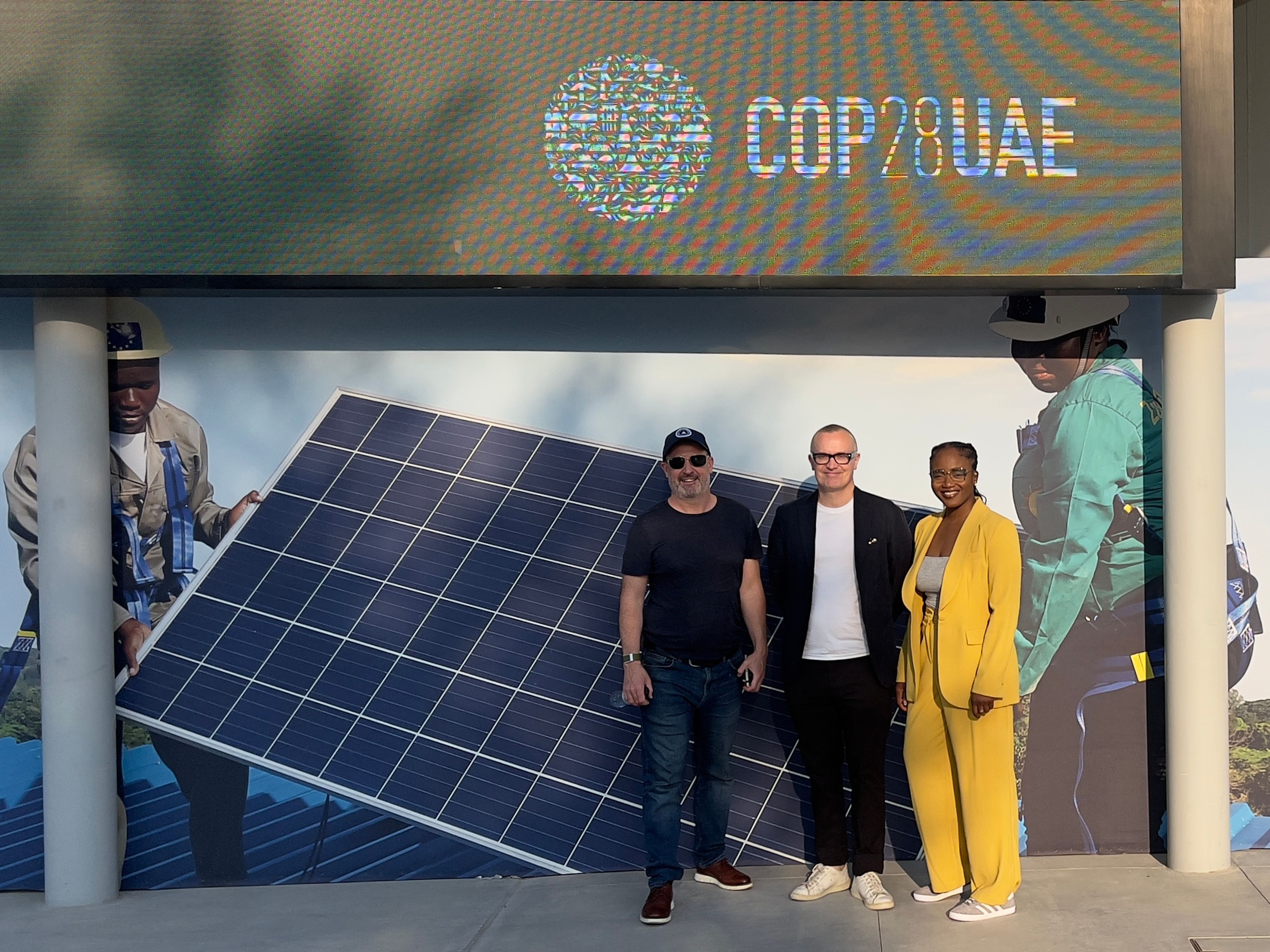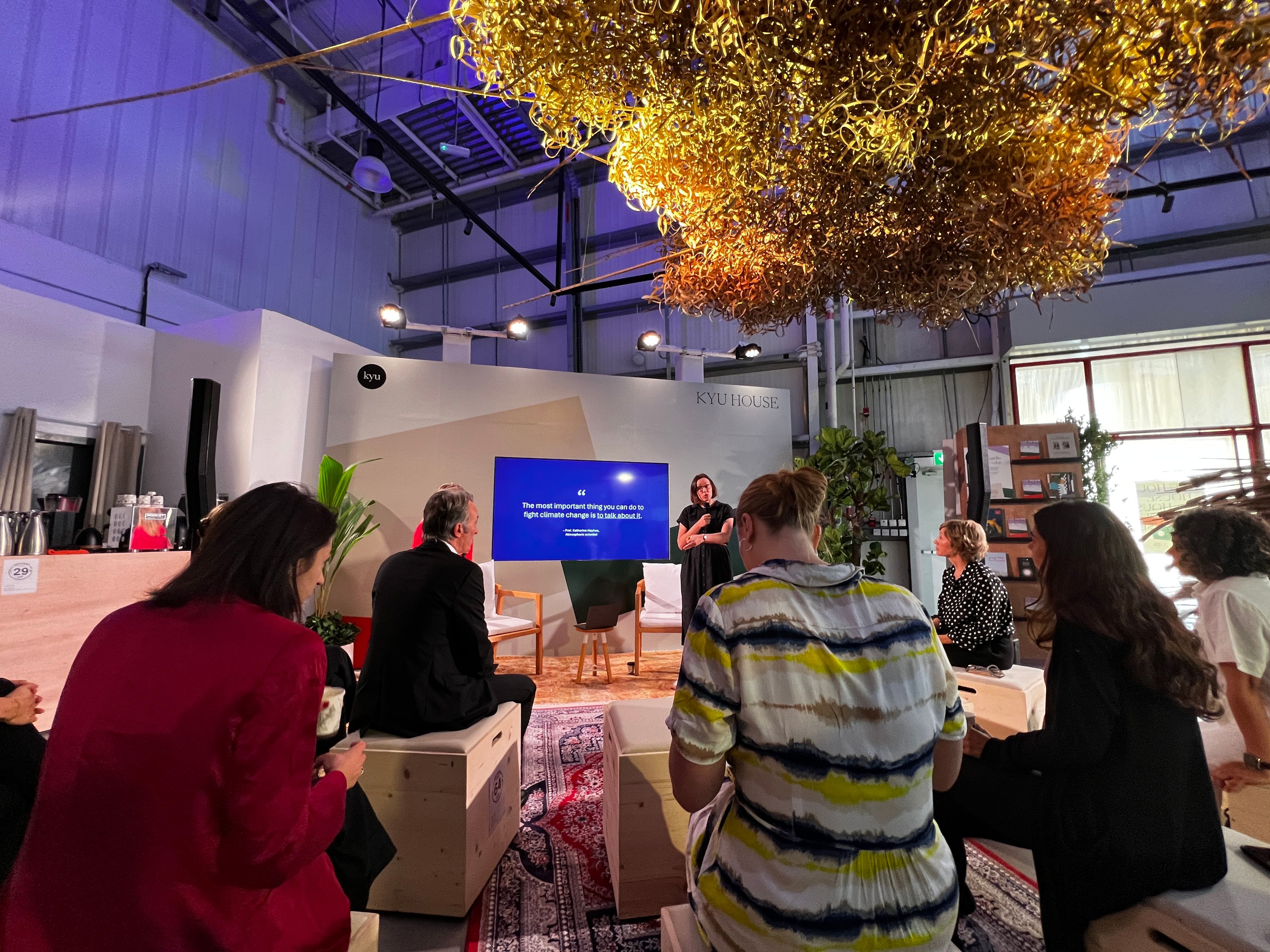Emerging intersections: digital transformation and climate change
Late last year, Ben Terrett, Mike Bracken and Onyeka Onyekwelu attended COP28 in Dubai.

Public Digital had been invited as one of the partners in the Kyu Collective, and were based in Kyu House.
This was our second time attending COP, with the first being COP26 in 2021. Much like the city it was hosted in, COP28 was grand and buoyant with activity. It was easy to feel overwhelmed by the sheer scale of it all.

However, its scale served as a physical manifestation of just how significant the issue of climate change has become.
While we are relative newcomers to the conversation, Public Digital is eager to learn more about the challenges we face in managing the effects of climate change and reducing global emissions, and what we as digital practitioners can bring to the table.
Emerging intersections: Digital and climate change
The challenges we face in tackling the climate crisis are unique. They demand the expertise of a range of actors, from scientists to policy-makers and local change-makers.
However, at last month's COP, and more broadly in the climate conversation, we have observed elements of common ground between the challenges confronted by climate practitioners in tackling the climate crisis and those faced by digital practitioners in steering transformation.
Tackling climate change is a colossal challenge. It demands unprecedented change and ingenuity in environments which can be resistant towards - or ignorant of - the possibility of that change. It often involves making those changes happen quickly, and under pressure.
As people who undertake pioneering work in transforming organisations for the internet era, digital practitioners work to implement change that, likewise, is large-scale, unfamiliar and - at times - unwelcome.
That means coming up against major challenges: misconceptions about digital, resistance from stakeholders, and bureaucracy which inhibits change. It means working out how complex systems and siloed structures of power can be leveraged for real change.
These challenges may sound familiar to those leading change to address the climate crisis, and perhaps there is scope for the same solutions to be applied.
In this post we explore some of those intersections.
The challenge of language
“Does anyone outside of this room truly understand the term ‘carbon’?” A CEO asked in one of the sessions at Kyu House during COP.
Climate change is a technical subject, so its language - and the complexity of its science - can be alienating. The same is true of digital transformation, where the terms we use to communicate about digital technology, such as ‘design’ or ‘user’, can mean different things to different people. Those without a technology background might be familiar with these terms, but those without can often feel alienated and discouraged.
Like digital transformation, dealing with climate change demands serious engagement from people across a vast number of disciplines. This includes those without a technical climate science or technology background.
Digital practitioners counter this problem by bringing things back to basics. The early part of our transformation work with clients involves defining what we mean by ‘digital’. We refer to this stage of an engagement as ‘getting on the same page’. By interrogating meanings, we encourage everyone to grow in confidence by being able to use the same language.

The challenge of organisational complexity
In leading and shaping climate agendas, there is often a knotty ambiguity in the way that power levers, action, and accountability function. While it may be easy enough to publish a climate agenda, the question of how those goals will be achieved, and who precisely is responsible for implementing them, is less obvious.
For instance, countries such as the UK set ambitious targets to reduce carbon emissions by 68% by 2030 but it is only at the local government level (of which the UK has over 300) that meaningful action can be taken. With this responsibility delegated, it is difficult for local actors to know how to make real change happen.
The same is true of digital transformation, where large organisations may have a clear goal - such as to become ‘internet era’ ready - but lack an actionable roadmap setting out how to achieve this.
As digital practitioners, we address this by breaking down processes. We examine how each part of the structure works, identify where challenges arise, and set out clear recommendations that leaders and their teams can implement to deliver change.
The challenge of purported ‘quick fixes’
There was a notable amount of rhetoric at COP28 regarding the power of technology, innovation and data to save us from the climate crisis.
There are parallels between this buzz around AI and data in climate discourse and the zeal for fix-all ‘tech’ solutions in environments where digital change is being pursued.
In digital transformation projects, there is a tendency for organisations to chase after technology solutions, such as new software or the roll-out of an app, in the hope that these alone will enable transformation.
While it is tempting to think that applying tools like data or AI can fix the climate crisis, digital practitioners know from experience that this is rarely - if ever - the case.
The values of many digital practitioners emphasise the importance of ‘teams before tech’: For any new technology solution to have an impact, the culture of the organisation - its structures, its teams, its processes - must first be carefully adapted for change.
Which is why the core part of our work facilitating transformation focuses not on ‘tech’ but on the culture of our client organisations, and the introduction of new ways of working which will enable sustainable and meaningful change.
Looking ahead
We are undeniably in a crisis.
However, one of the strongest and most hopeful messages we observed at this year’s COP was the power we all have to help make change happen.
Whilst the task of digital transformation bears significant differences to that of dealing with climate change, with a very different set of risks attached, a commonality is the need for experimentation and open-mindedness.
In this urgent work of addressing climate change, it is not only climate scientists who have the answers. Instead, ideas, solutions and learnings will be found everywhere.
At Public Digital we aim to keep learning about how we can harness digital in the mammoth task of tackling climate change, and where our expertise in the challenges of large-scale transformation can contribute.